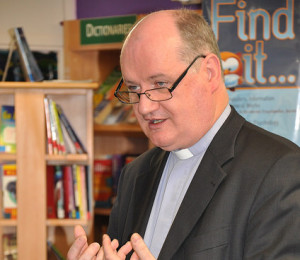
By Sarah Mac Donald - 31 October, 2014
 The chairperson of the Catholic Schools Partnership, Fr Michael Drumm, has said the patrons, managers and employees of denominational schools have legal and moral obligations to parents to ensure these schools live out the ethos they espouse.
The chairperson of the Catholic Schools Partnership, Fr Michael Drumm, has said the patrons, managers and employees of denominational schools have legal and moral obligations to parents to ensure these schools live out the ethos they espouse.
In an address at recent meeting of the Council of the Catholic Schools Partnership, Fr Drumm said that if they were denied the means to do so, the constitutional right of parents to access a denominational education could be nullified.
Referring to recent public comment on Section 37 of the Employment Equality Act, Fr Drumm said much of it had been negative in tone and had stated that this section seriously undermines the human rights of teachers working in denominational schools.
“It is important to bring some balance into this debate, not least because a provision like Section 37 is all about the balancing of legitimate rights,” he stated.
He said Section 37 allows employers with a religious ethos to give “more favourable treatment” to employees on the ground of religion.
“Thus a church, a temple, a synagogue, a mosque does not discriminate if it requires that certain employees must share the faith that is supported and celebrated in these institutions,” the Chairman of the CSP explained.
Section 37 allows employers with a religious ethos to do that.
“In so doing the Employment Equality Acts are giving expression to the constitutional right of religious denominations to manage their own affairs,” the priest said and referred to Article 44 of the Irish Constitution.
In relation to denominational schools, he highlighted that Article 42 of the Irish Constitution acknowledges that the primary and natural educator of the child is the family.
He said it also respects the inalienable right and duty of parents to provide for the religious, moral, intellectual, physical and social education of their children.
“Clearly, very many parents wish, in accordance with their constitutional rights, to provide this education for their children through denominational schools. These schools – Catholic, Protestant, Jewish, Muslim – are founded on a particular religious ethos.”
He added that religious faith is experienced by believers as a source of hope and enlightenment (not a restriction or unintelligent), a gift (not a choice or acquisition) and a blessing (not a burden or constraint).
“The patrons, managers and employees of denominational schools have legal and moral obligations to parents to ensure that these schools live out the ethos that they espouse. If they were denied the means to do so, the constitutional right of parents to access such a denominational education could be nullified,” the CSP chief warned.
He also underlined that the employment rights of teachers must be respected. “Teaching is among the most demanding of all human endeavours,” he observed.
But he said these legitimate rights must be reconciled and balanced with the rights of parents regarding the education of their children.
Striking the right balance is the responsibility of our law makers and Section 37 is an effort to balance these legitimate rights.
According to Fr Drumm, those who propose to amend it must also seek balance. “In doing so they should keep in mind that schools do not exist primarily to employ teachers but to assist parents in the education of their children.”
He added that many European countries have provisions similar to section 37.
“European Union employment law clearly recognises the importance of ethos in religious institutions. Any rebalancing of Irish law should take account of the European directives,” he said.